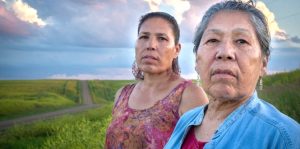
One thing that might have helped speed up the demise of the Roman Empire was a peculiar faith that some of its soldiers practiced called Mithraism.
It’s called a mystery religion for a very good reason. We don’t know much about Mithraism except for some relief sculptures. Despite some complicated liturgy, it died out after the fourth century CE because a now obvious oversight: It made no provisions for women.
The new documentary Warrior Women is a powerful corrective for anyone who thinks women are the weaker or fairer sex. Focusing primarily on the 78-year-old Lakota activist Madonna Thunder Hawk, directors Elizabeth Castle and Christina King reveal how she and others helped keep American Indian traditions from dying out like Mithraism. In some cases, female activists don’t provide support for the men. In the case of Thunder Hawk, she’s leading the charge.
When white men were repeatedly raping Indian women in her community, she and some of her peers beat one of the assailants within an inch of his life. The only reason he survived the pummeling was to serve as a warning to others. Thunder Hawk’s tactic proved as effective as it was brutal. The rapes stopped after that.
“…how she and others helped keep American Indian traditions from dying out…”
Thunder Hawk founded a series of “Survival Schools” where she and other taught Indian children a history that had been ignored elsewhere as well as how to grow food and live off the land. These schools are modest affairs, but her alumni sing her praises throughout Warrior Women.
If getting near 80 has slowed Thunder Hawk down, it doesn’t show in the film. People still come to her for advice on legal disputes. She helps these people find attorneys lets them know what experience has taught her about similar disputes.
Thunder Hawk has spearheaded and participated in a long series of campaigns that have been successful (one that stopped Union Carbide from uranium mining) and some that have been little more symbolic than lasting (occupying historic sites like Wounded Knee). After all of that, she still took part in the campaign to shut down the Dakota Access Pipeline.
Castle and Long have a lot of ground to cover with Thunder Hawk, and at just over an hour Warrior Women could have actually benefitted from a longer running time. The film brings up the FBI’s infamous domestic espionage program COINTELPRO, in which the Bureau used illegal means to subvert groups like the American Indian Movement (AIM) and the Black Panthers. If you are unfamiliar with the unrest in Indian Country during the 1970s, you might have to rewind the video to grasp what’s happening in the film.
“…bristles when one of the students mentions that George Washington was the father of our country.”
A little extra time would have also helped flesh out, Thunder Hawk. She’s an undeniably fascinating person, but only later in the film do we learn about her possible shortcomings Her daughter laments that she had to raise herself has her mother raised hell, but because she’s eagerly following her mom’s crusades, Thunder Hawk must not have been a bad parent.
Castle and Long have assembled an impressive amount of footage from the 70s and 80s that follows Thunder Hawk as she teaches her classes. She understandably bristles when one of the students mentions that George Washington was the father of our country.
As the title implies, Thunder Hawk is not an isolated example of her commitment to retaining Indian culture. Without someone like her around, civilizations die.

Warrior Women (2018) Directed by Elizabeth Castle and Christina King.
7 out of 10



I admire the warrior women. They have been through so much.
I’m in awe and inspired by the message of the film. Yakoke